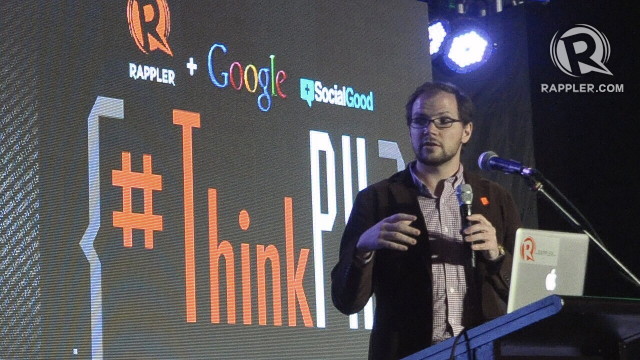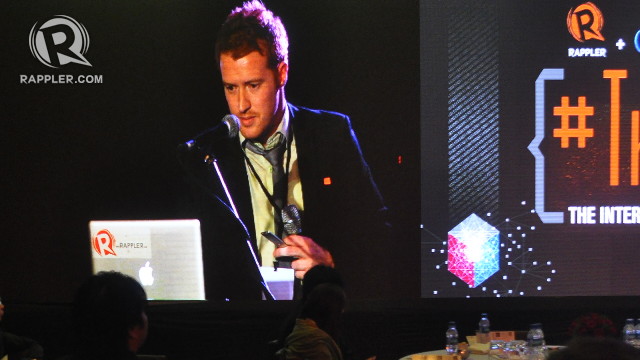SUMMARY
This is AI generated summarization, which may have errors. For context, always refer to the full article.
MANILA, Philippines – The influence of the individual has never been as powerful as in the age of the Internet.
With one tweet, a netizen can sway public opinion. People equipped with only a phone and access to the Web can start a revolution or two. Brands have crossed over from print and television to reach online consumers, eager to amplify their influence as well.
Two speakers at “#ThinkPH: The Internet, Big Data and You,” a social good summit organized by Rappler, Google and +Social Good, spoke about mining data from the Internet to understand this magnified influence and its implications on journalism, branding and marketing.
Brands and sentiment analysis
Robin Leonard, a digital strategist and CEO of search engine optimization company All-Famous, has worked with brands like Deutsche Bank, IBM, Bridgestone and Vodafone.
An expert in analytics and digital marketing, he shows brands how they can reach consumers through the Internet and use data from social media to create more effective marketing strategies.
Sentiment analysis uses text analytics and natural processing to identify how a consumer feels or thinks about a topic. Leonard showed how sentiment analysis can help brands determine how netizens feel or think about them, their products and their services.
Have you ever complained about a product via Twitter? Ever tweeted your opinion of a politician or government agency?
If you have, chances are, people like Leonard are listening to you, analyzing your tweets from the powerful words you use (“love,” “hate,” “buy,” “frustrated”) to your hashtags (#sarcasm, #happy).
Thus, they can roughly categorize these “mentions” of products and brands under positive, negative, mixed or sarcastic mentions.
But like any technology attempting to “read” emotions and sentiment, it’s not a fool-proof method.
People express opinions in complex ways. They may be sarcastic when they tweet but not indicate it with a telling hashtag. Cultural idiosyncrasies make definitions of irony different depending on the country or community.
What can companies do with this kind of data? Leonard said it allows them to make a targeted response to consumers in order to better burnish their brands.
An “angry mention” should prompt companies to immediately resolve the netizen’s source of frustration whether it’s rude staff or slow service. When a netizen’s tweet shows that they are curious about the product, companies should rush to educate them about it. And what to do when a netizen is happy about your brand? Amplify it by sharing the tweet.
Rappler and big data
But brands are not the only ones that stand to benefit from big data.
Individuals, who have on some level become brands themselves because of the Internet, can also use big data to widen their influence and become voices people listen to.
Russell Shepherd, Rappler’s resident data scientist, showed how Rappler uses big data to spread content more effectively, establish stronger connections with readers and bridge the gap between journalism and readers.
Conventional marketing today involves a two-step process in which opinion generators produce content and influencers evangelize to the general population.
This strategy can be applied to social media.
But it’s not as simple as that.
Analytics show that netizens are smart enough to know when a tweet is sponsored, as when a brand pays an influencer to tweet about a product. Tweets like this don’t necessarily get retweeted many times over. Twitter users are more likely to retweet an influencer if they feel a strong connection to them. A direct relationship also helps as when a Twitter user is friends with the influencer or is being followed by the influencer.
Topics are also a big determining factor. Tweets about topics people don’t care about won’t get retweeted no matter how influential the Twitter user is.
Big data allows Rappler to identify influencers, monitor topics that matter most to people and spot communities that can be tapped to spread content on particular topics.
Big data means that influence is no longer as abstract as it used to be. It can be tabulated, monitored, traced and amplified in degrees using the technology we have today. But only humans can decide to use influence for ill or for good. – Rappler.com
Add a comment
How does this make you feel?


There are no comments yet. Add your comment to start the conversation.